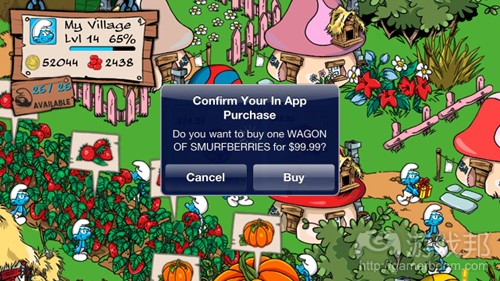阐述免费游戏遭遇儿童玩家时的困境
作者:William Volk
《Soupy Sales》是一档搞笑电视真人节目。在节目中,Sales要求年幼的观众们,偷偷摸进仍在酣睡的父母的卧室,把父母的裤子口袋和皮夹子里的“印着美国总统的绿纸片”(美元)拿出来,“放进信封并邮寄给我”。结果是,他被停职两周。
Sales的表演只是让他收到了几张邮寄过来的美元,因为大部分观众不知道怎么邮寄现金。毕竟,那是一档播放于60年代的真人节目,不是一款内置IAP的手机游戏。今天,如果孩子可以得到一个iTunes帐号的密码,他们就更容易把“印着美国总统的绿纸片”寄出去了。发现自己的孩子迅速花掉十几美元、几百美元或甚至几千美元时,父母总是很震惊的。
看看下面这些标题:
*3000美元的iTunes帐单吓坏母亲
*父母收到Apple退还给女儿的4000美元游戏款
*8岁儿童未经父母同意购买IAP,苹果退还6131美元的iTunes费用
*Bristol市男孩冲动消费后,iTunes退还其1700英镑
是的,父母给孩子他们自己的帐号密码是错误的。而且,这些孩子玩的还是针对更加大龄的受众的游戏(游戏邦注:如某儿童在策略游戏《Clash of Clans》中狂砸3000美元)。
免费游戏的生存很大程度上依赖于那些把大部分收入用于购买游戏和IAP的“鲸鱼”玩家。一款游戏可能只有2%-3%的付费玩家。这对于针对青少年和成年人的社交赌博游戏没什么问题。苹果规定这类游戏的玩家年龄必须在12岁以上。
许多儿童游戏,如《SpongeBob Moves In》、《My Little Pony》、《Skylanders: Lost Islands》和《Littlest Pet Shop》都提供IAP,甚至标价高达99.99美元。《SpongeBob Moves In》(4岁以上)的下载费用是3.99美元,根本算不上免费游戏。所以甚至那些想避开免费游戏的父母也为这些IAP感到震惊。
从上面举例的标题可知,苹果最终退还了那些购买IAP的钱。这是一个明智的决定。
正如加拿大网络政策和公共安全局(Internet Policy and Public Interest Clinic)的领导David Fewer所说:“3000美元、5000美元、10000美元的信用卡账单——当看到这些数字时,人们肯定要抱怨的,因为实在不是小数目。但如果只是20美元或40美元,父母就不会太计较了。”
这里的危险是政治机会。在2011年,Edward J. Markey、Amy Klobuchar和Mark Pryor分别致信联邦贸易委员会主席Jon Leibowitz,要求消费者保护局调查《Smurfs Village》和《Tap Zoo》等游戏。调查的结果是,要求App Store更加严格管理购买IAP的密码。同年2月,苹果被若干家长一起送上诉讼席。
现在的问题是,针对5岁儿童的游戏甚至比2011年时更加依赖IAP。排行榜表明,名列前20名的儿童游戏中有17款具有IAP。
我认为,再次导发政策打击只是一个时间问题。对IAP的额外限制可能损害社交赌博游戏和其他不以儿童为受众的游戏。IAP购买可能要加一个消费上限。
对发行商和苹果而言,鼓励开发面向年幼玩家的付费应用,也许是个明智的选择。我承认我是有偏见的。我甚至认为儿童游戏不应该走免费路线。靠广告赢利也是一个选择。明智的父母会选择让他们年纪尚小、无法处理购买事宜的孩子玩没有IAP的付费游戏。苹果确实提供了一种“零花钱”系统,允许父母设置每月消费限度。
注意:8月14日,苹果修改了它的App Store审查准则,如添加了一个新栏目叫作“儿童的应用”,为作iOS 7 引入教育应用作准备。改进后的开发者指南要求针对13岁及以下的儿童应用必须加入隐私政策、不可以插入行为性广告(如以IAP活动为基础的广告)、允许儿童“链接到IAP”时必须经过父母同意。另外,App Store的儿童类应该必须明确地分为“5岁及以下、6-8岁、9-11岁”。
我认为苹果将会密切关注针对这些年龄段儿童、包含高成本的内置数字内容的应用。(本文为游戏邦/gamerboom.com编译,拒绝任何不保留版权的转载,如需转载请联系:游戏邦)
Free-to-play games are having their Soupy Sales moment
by William Volk
Angered by having to work on the holiday on Jan. 1, 1965, comic Soupy Sales ended a live TV children’s show by asking his young viewers to tiptoe into their still-sleeping parents’ bedrooms and remove those “funny green pieces of paper with pictures of U.S. presidents” from their pants and pocketbooks. “Put them in an envelope and mail them to me,” Sales instructed the children. He received a two-week suspension.
Sales’ stunt only netted a few dollars in the mail, as most viewers didn’t know how to mail in cash. After all, this was a live TV show in the 1960s, not a mobile game with in-app purchases. Nowadays, if a child can get the password to say, an iTunes account, it’s far easier for them to send those “funny green pieces of paper with pictures of U.S. presidents” on them. Parents are often shocked to find their children running up charges in the tens, hundreds, or even thousands of dollars.
Consider these headlines:
$3,000 iTunes bill stun mom
iDad gets Apple refund for girl’s £4k game bill
Apple refunds $6,131 iTunes bill for 8-year-old’s unauthorized in-app purchases
iTunes refund after Bristol boy’s £1,700 spending spree
Yes, the parents are erring by giving their own passwords to their children. Often the children are playing games targeted at an older audience (the $3,000 example was for the strategy game Clash of Clans).
Freemium games depend on “whales,” users who make large purchases, for much of their income. A typical title may only have 2 percent to 3 percent of players making purchases. This isn’t a problem with social casino games targeted at teens and adults. These are rated at ages 12+ by Apple.
Many children’s games, like SpongeBob Moves In, My Little Pony, Skylanders: Lost Islands, and Littlest Pet Shop, offer in-app items as expensive as $99.99. The SpongeBob game (rated ages 4+) isn’t even a freemium title, as the download runs $3.99. So even parents trying to avoid free-to-play games can get surprised by these purchases.
In the headlines above, Apple eventually did refund the purchases, a wise decision.
As David Fewer, the director of the Canadian Internet Policy and Public Interest Clinic, says, “The $3,000, $5,000, $10,000 bills — people are really going to complain about that when they show up, because it’s pretty noticeable on your credit card statement. But if it’s just $20 or $40, parents are going to go into that cost-benefit calculation.”
The danger here is political opportunity. In 2011 these stories motivated then-Rep. Edward J. Markey (D-Mass.) and Sens. Amy Klobuchar (D-Minn.) and Mark Pryor (D-Ark.) to send separate letters to Federal Trade Commission chairman Jon Leibowitz, asking the consumer protection agency to investigate games such as Smurfs Village and Tap Zoo. The investigation led to a tightening of the App Store by Apple, making passwords mandatory for in-app purchases. In February, Apple settled a class action lawsuit by parents.
The problem today is that apps targeted for 5 year olds are relying on in-app purchases even more so than they did in 2011. The top-grossing children’s game category shows 17 out of the top 20 are doing just that.
I believe it is just a matter of time before political opportunity strikes again. The danger is that additional restriction on in-app purchasing could hurt social casino and other games not intended for children. Spending caps could be required.
It would be wise for publishers and Apple to encourage a switch to paid apps for very young children. I admit a bias. I didn’t even consider going the freemium route for our children’s games. Ad supported titles are also an alternative. Parents would be wise to look for paid games with no in-app purchases for their youngest children who may lack to maturity level to deal with the consequences of buying items for their favorite games. Apple does offer an “allowance” system that allows parents to set monthly spending limits.
Note: On Aug. 14, Apple modified its App Store Review Guidelines. These changes include a whole new section on “Kids Apps” in preparation for the implementation of sweeping changes to its educational program with the introduction of iOS 7. The revised developer guidelines detailing apps for children under aged 13 specify that such apps must include a privacy policy, may not include behavioral advertising (ads based on in-app activity, for example), and must ask for parental permission before allowing children to “link out of the app or engage in commerce.” Also, apps in the Kids Category of the App Store must be made specifically for children “ages 5 and under, ages 6–8, or ages 9–11.”
I suspect Apple will be playing close attention to apps targeted to these age segments that include high cost in-app digital content.(source:venturebeat)
下一篇:独立开发者与美术工作室的合作建议








































 闽公网安备35020302001549号
闽公网安备35020302001549号